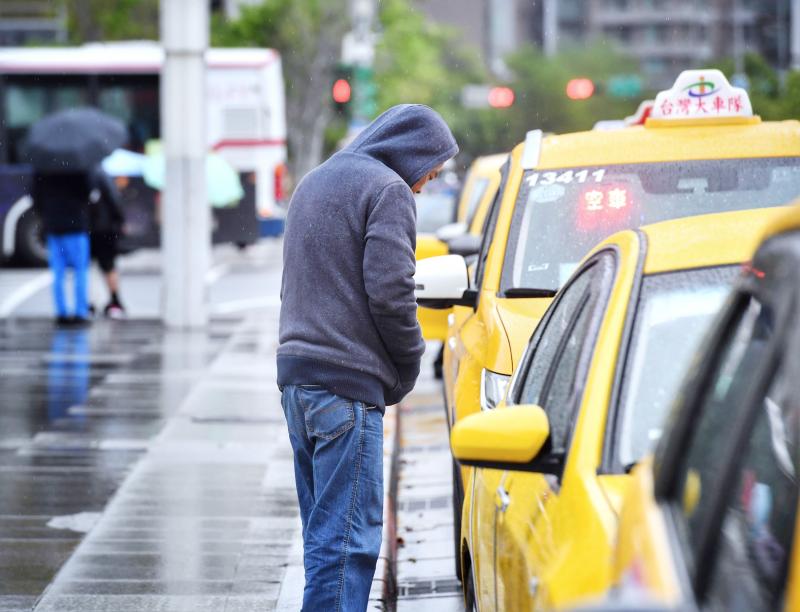Even with more than NT$450 billion (US$14.85 billion) in financial aid from the Executive Yuan’s expanded relief package, local tourism-related businesses are unlikely to rebound from the COVID-19 pandemic any time soon, a central bank report released last month said.
The NT$1.05 trillion relief package includes NT$472 billion in financial assistance for tourism and transportation sectors, such as airlines, hotels, travel agencies, taxis and tour buses.
However, a March 20 central bank report said that the effects of the COVID-19 pandemic on global and domestic economies are far greater than that of the 2002-2003 SARS epidemic, despite any benefits from delayed purchases after the crisis ends.

Photo: CNA
Tourism-related industries would be hardest hit, with widespread travel restrictions and bans on mass gatherings imposed by governments worldwide.
“It is difficult to say that there will be a V-shaped recovery at the moment, as it all depends on the development of the pandemic,” the report said.
Taking the SARS epidemic that broke out in late 2002 as an example, the bank said that the local economy rapidly lost momentum in the second quarter of 2003 after the disease took its toll on global activity.
Over that three-month period, travel on international flights to and from Taiwan fell 69.5 percent and the nation’s economy contracted 1.15 percent in 2003 as a result of the knock-on effects of SARS, the bank said, adding that the effects of COVID-19 are more severe.
Passenger load factors in February on routes between Taiwan and China, Hong Kong and Macau fell by more than 90 percent, compared with their levels in December last year, the report said, citing Tourism Bureau statistics.
At the same time, taxi drivers had 30 percent fewer passengers, while tour bus operators also experienced a 17.2 percent decline in daily operations from January, the report said.
The central bank said that the restaurant and beverage sector typically has the highest GDP ratio from the tourism industry, while tour agencies, hotels, and car rental and air transportation companies also earn a noticeable portion of their incomes from it.
Therefore, as domestic and foreign tourists’ travel activities stagnate in Taiwan, tourism-related businesses would face greater difficulties, the bank said.
Due to Taiwanese’s strong interest in traveling abroad, coupled with Beijing’s ban on independent tourists to Taiwan from Aug. 1 last year, Taiwan registered travel deficits of US$6.1 billion last year, a new high, central bank data showed.
However, the travel deficits would likely shrink this year, because of COVID-19, the bank said.

CHIP RACE: Three years of overbroad export controls drove foreign competitors to pursue their own AI chips, and ‘cost US taxpayers billions of dollars,’ Nvidia said China has figured out the US strategy for allowing it to buy Nvidia Corp’s H200s and is rejecting the artificial intelligence (AI) chip in favor of domestically developed semiconductors, White House AI adviser David Sacks said, citing news reports. US President Donald Trump on Monday said that he would allow shipments of Nvidia’s H200 chips to China, part of an administration effort backed by Sacks to challenge Chinese tech champions such as Huawei Technologies Co (華為) by bringing US competition to their home market. On Friday, Sacks signaled that he was uncertain about whether that approach would work. “They’re rejecting our chips,” Sacks

NATIONAL SECURITY: Intel’s testing of ACM tools despite US government control ‘highlights egregious gaps in US technology protection policies,’ a former official said Chipmaker Intel Corp has tested chipmaking tools this year from a toolmaker with deep roots in China and two overseas units that were targeted by US sanctions, according to two sources with direct knowledge of the matter. Intel, which fended off calls for its CEO’s resignation from US President Donald Trump in August over his alleged ties to China, got the tools from ACM Research Inc, a Fremont, California-based producer of chipmaking equipment. Two of ACM’s units, based in Shanghai and South Korea, were among a number of firms barred last year from receiving US technology over claims they have

It is challenging to build infrastructure in much of Europe. Constrained budgets and polarized politics tend to undermine long-term projects, forcing officials to react to emergencies rather than plan for the future. Not in Austria. Today, the country is to officially open its Koralmbahn tunnel, the 5.9 billion euro (US$6.9 billion) centerpiece of a groundbreaking new railway that will eventually run from Poland’s Baltic coast to the Adriatic Sea, transforming travel within Austria and positioning the Alpine nation at the forefront of logistics in Europe. “It is Austria’s biggest socio-economic experiment in over a century,” said Eric Kirschner, an economist at Graz-based Joanneum

OPTION: Uber said it could provide higher pay for batch trips, if incentives for batching is not removed entirely, as the latter would force it to pass on the costs to consumers Uber Technologies Inc yesterday warned that proposed restrictions on batching orders and minimum wages could prompt a NT$20 delivery fee increase in Taiwan, as lower efficiency would drive up costs. Uber CEO Dara Khosrowshahi made the remarks yesterday during his visit to Taiwan. He is on a multileg trip to the region, which includes stops in South Korea and Japan. His visit coincided the release last month of the Ministry of Labor’s draft bill on the delivery sector, which aims to safeguard delivery workers’ rights and improve their welfare. The ministry set the minimum pay for local food delivery drivers at